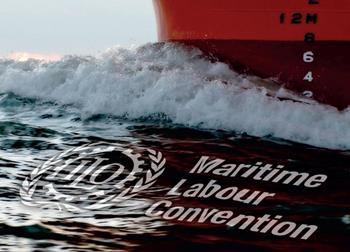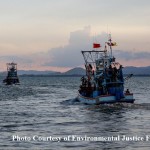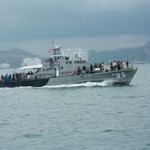
Thailand took another step towards cleaning up its long-neglected fishing industry last week when it ratified the International Labor Organization’s (ILO) Maritime Labor Convention, which calls for compliance and enforcement mechanisms to improve the welfare of seafarers.
Minister of Labor Sirichai Distakul deposited the instrument of ratification with the International Labor Organization in Bangkok last week. The convention came into force in 2013 after 30 countries ratified it, and will come in force for Thailand in 2017. The Convention is one of several ILO treaties recently ratified or moving towards ratification through the Thai parliament in support of the Kingdom’s campaigns to end human trafficking, labor abuse and promote better working conditions in its fishing, seafood and other sectors.
The Maritime Labor Convention contains five titles dealing with minimum requirements for seafarers to work on a ship; conditions of employment; accommodation, recreational facilities, food and catering;health protection, medical care, welfare and social security protection;and compliance and enforcement.
“The ratification of the Maritime Labor Convention, 2006 by Thailand is yet another testimony of the importance of the Convention for countries worldwide,” said ILO Director-General Guy Ryder. “Thailand has more than 12,000 seafarers and a merchant fleet of 3,368,993 gross tons. I welcome this new ratification that brings one more important player in the Asia Pacific region within the scope of the [Convention], thereby providing additional protection for seafarers transiting within waters of the region.”
Last week also marked the official coming into force of the Port States Measures Agreement promoted by the Food and Agriculture Organization of the United States and to which Thailand recently became a signatory, also as part of its program to clean up its fishing industry.
The Agreement requires countries to inspect fishing vessels entering their ports for signs or evidence of illegal catches or illegal, unreported and unregulated (IUU) fishing. Signing on to the agreement is part of Thailand’s efforts to establish a catch traceability system.
“This is a great day in the continuing effort to build sustainable fisheries that can help feed the world,” said Graziano da Silva, director general of the FAO.
Thailand has established 28 Port-In/Port-Out inspection centers along its coastal provinces where officials inspect fishing vessels to ensure they are not engaged in illegal fishing, labor abuse or human trafficking.
Destructive fishing gear has also been banned, and breeding areas placed off limits to fishing trawlers. Fishing vessels 30 tons and larger are now required to install a vessel monitoring system so the authorities can track their movements for signs of illegal fishing.
More than 8,000 fishing ships that did not meet the new requirements had their licenses to fish revoked, and the government is implementing a buy back program for vessel owners who cannot meet the new requirements.
Image credit: http://www.slideshare.net/asbasak/ilo-mlc-2006-psc-guidance




